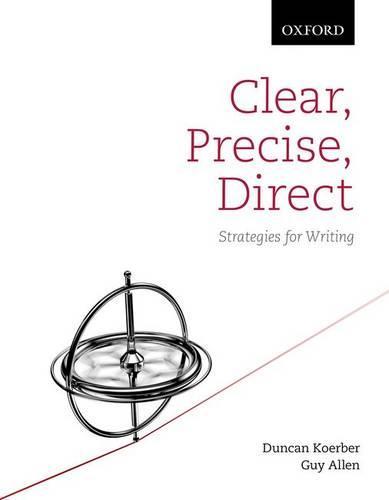Full Product Details
Author: Duncan Koerber (Instructor in the Professional Writing Program, Instructor in the Professional Writing Program, York University) ,
Guy Allen (Program Coordinator for the Professional Writing and Communication Program, Program Coordinator for the Professional Writing and Communication Program, University of Toronto)
Publisher: Oxford University Press, Canada
Imprint: Oxford University Press, Canada
Dimensions:
Width: 18.10cm
, Height: 1.50cm
, Length: 22.90cm
Weight: 0.462kg
ISBN: 9780199006403
ISBN 10: 0199006407
Pages: 304
Publication Date: 30 October 2014
Audience:
College/higher education
,
Undergraduate
Format: Paperback
Publisher's Status: Active
Availability: To order

Stock availability from the supplier is unknown. We will order it for you and ship this item to you once it is received by us.
Reviews
""Perhaps strong above all is this text's emphasis on process (e.g., the importance of freewriting) as well as the richness of the instruction throughout that seems to come from tearing down the wall between composition and 'creative' writing. Freedom at last!"" --Sheila M. Ross, Capilano University ""I find this text to be applicable to both expository and creative writing classes, and it's great that the text can bridge these different aspects of writing instruction. . . . This text is in many ways new in its approach, and I think its innovative nature is most welcome in the world of textbooks."" --Christopher Lee, Western University
Perhaps strong above all is this text's emphasis on process (e.g., the importance of freewriting) as well as the richness of the instruction throughout that seems to come from tearing down the wall between composition and 'creative' writing. Freedom at last! --Sheila M. Ross, Capilano University I find this text to be applicable to both expository and creative writing classes, and it's great that the text can bridge these different aspects of writing instruction. . . . This text is in many ways new in its approach, and I think its innovative nature is most welcome in the world of textbooks. --Christopher Lee, Western University
I find this text to be applicable to both expository and creative writing classes, and it's great that the text can bridge these different aspects of writing instruction. . . . This text is in many ways new in its approach, and I think its innovative nature is most welcome in the world of textbooks. * Christopher Lee, Western University * Perhaps strong above all is this text's emphasis on process (e.g., the importance of freewriting) as well as the richness of the instruction throughout that seems to come from tearing down the wall between composition and 'creative' writing. Freedom at last! * Sheila M. Ross, Capilano University *
Perhaps strong above all is this text's emphasis on process (e.g., the importance of freewriting) as well as the richness of the instruction throughout that seems to come from tearing down the wall between composition and 'creative' writing. Freedom at last! Sheila M. Ross, Capilano University I find this text to be applicable to both expository and creative writing classes, and it's great that the text can bridge these different aspects of writing instruction... This text is in many ways new in its approach, and I think its innovative nature is most welcome in the world of textbooks. Christopher Lee, Western University
Author Information
Duncan Koerber teaches in the Professional Writing Program at York University. He is the founder of Mediahistory.ca, a bibliographic database for the growing academic field of media history in Canada. Guy Allen is the program coordinator for the Professional Writing and Communication Program at the University of Toronto. He has won three university-wide teaching awards and the 3M National Teaching Fellowship. He also co-founded Life Rattle Press, a non-profit publisher of narrative literature.




